Tekton Cloud-native Pipeline
Running Event-driven Trace-based Tests
Tekton is a powerful and flexible open-source framework for creating CI/CD systems, allowing developers to build, test, and deploy across cloud providers and on-premise systems.
Tracetest is a testing tool based on OpenTelemetry that allows you to test your distributed application. It allows you to use data from distributed traces generated by OpenTelemetry to validate and assert if your application has the desired behavior defined by your test definitions.
Why do we want to run Tracetest with Tekton?
Tracetest leverages existing OpenTelemetry instrumentation to run assertions against every part of an HTTP transaction.
By running Tracetest with Tekton you can now add trace-based testing to the native CI/CD pipeline in your Kubernetes cluster. It allows you to run scheduled test runs and synthetic tests. All while following the trace-based testing principle and enabling full in-depth assertions against trace data, not just the response.
Infrastructure Overview
The following is high level sequence diagram on how Tekton and Tracetest interact with the different pieces of the system:
Prerequisites
Make sure you have these three things installed before starting.
- A running Kubernetes cluster (either locally or in the cloud).
- Kubectl
- Helm
- Tekton CLI
Quickstart
Follow these steps to get started.
1. Install Tekton Pipelines and Triggers
Install Tekton Pipelines by following these instructions for Pipelines, and there instructions for Triggers. Or, run the command below.
kubectl apply --filename \
https://storage.googleapis.com/tekton-releases/pipeline/latest/release.yaml
kubectl apply --filename \
https://storage.googleapis.com/tekton-releases/triggers/latest/release.yaml
kubectl apply --filename \
https://storage.googleapis.com/tekton-releases/triggers/latest/interceptors.yaml
2. Install Tracetest CLI
Install Tracetest CLI by following these instructions for your OS.
# MacOS example
brew install kubeshop/tracetest/tracetest
3. Install Tracetest in Your Kubernetes Cluster
tracetest server install
How do you want to run TraceTest? [type to search]:
Using Docker Compose
> Using Kubernetes
Select Using Kubernetes.
Do you have OpenTelemetry based tracing already set up, or would you like us to install a demo tracing environment and app? [type to search]:
I have a tracing environment already. Just install Tracetest
> Just learning tracing! Install Tracetest, OpenTelemetry Collector and the sample app.
Select Just learning tracing! Install Tracetest, OpenTelemetry Collector and the sample app..
Confirm that Tracetest is running:
kubectl get all -n tracetest
NAME READY STATUS RESTARTS AGE
pod/otel-collector-7f4d87489f-vp6zn 1/1 Running 0 5m41s
pod/tracetest-78b9c84c57-t4prx 1/1 Running 3 (4m15s ago) 5m29s
pod/tracetest-postgresql-0 1/1 Running 0 5m42s
NAME TYPE CLUSTER-IP EXTERNAL-IP PORT(S) AGE
service/otel-collector ClusterIP 10.96.173.226 <none> 4317/TCP 5m46s
service/tracetest ClusterIP 10.96.248.146 <none> 11633/TCP,4317/TCP 5m42s
service/tracetest-postgresql ClusterIP 10.96.155.147 <none> 5432/TCP 5m42s
service/tracetest-postgresql-hl ClusterIP None <none> 5432/TCP 5m42s
NAME READY UP-TO-DATE AVAILABLE AGE
deployment.apps/otel-collector 1/1 1 1 5m46s
deployment.apps/tracetest 1/1 1 1 5m42s
NAME DESIRED CURRENT READY AGE
replicaset.apps/otel-collector-7f4d87489f 1 1 1 5m46s
replicaset.apps/tracetest-78b9c84c57 1 1 1 5m42s
NAME READY AGE
statefulset.apps/tracetest-postgresql 1/1 5m42s
By default, Tracetest is installed in the tracetest namespace.
To explore the Tracetest Web UI, run the command:
kubectl --kubeconfig <path-to-your-home>/.kube/config --context <your-cluster-context> --namespace tracetest port-forward svc/tracetest 11633
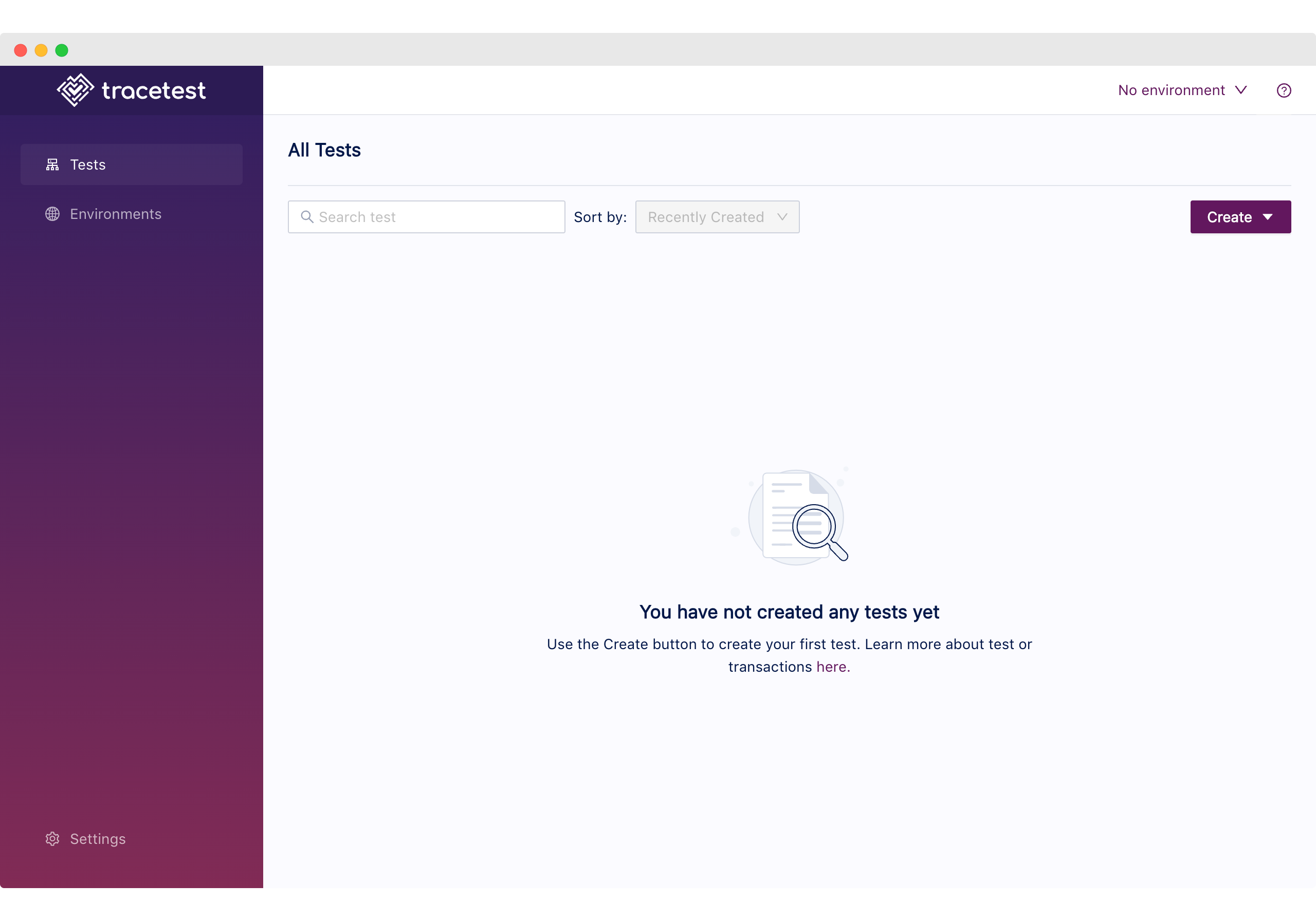
4. Create a Test in Tracetest
Start by clicking Create > Create New Test > HTTP Request > Next > Choose Example (dropdown) > Pokeshop - List (generates a sample test from the Tracetest demo) > Next > URL is prefilled with http://demo-pokemon-api.demo/pokemon?take=20&skip=0 > Create & Run.
This will trigger the test and display a distributed trace in the Trace tab to run assertions against.
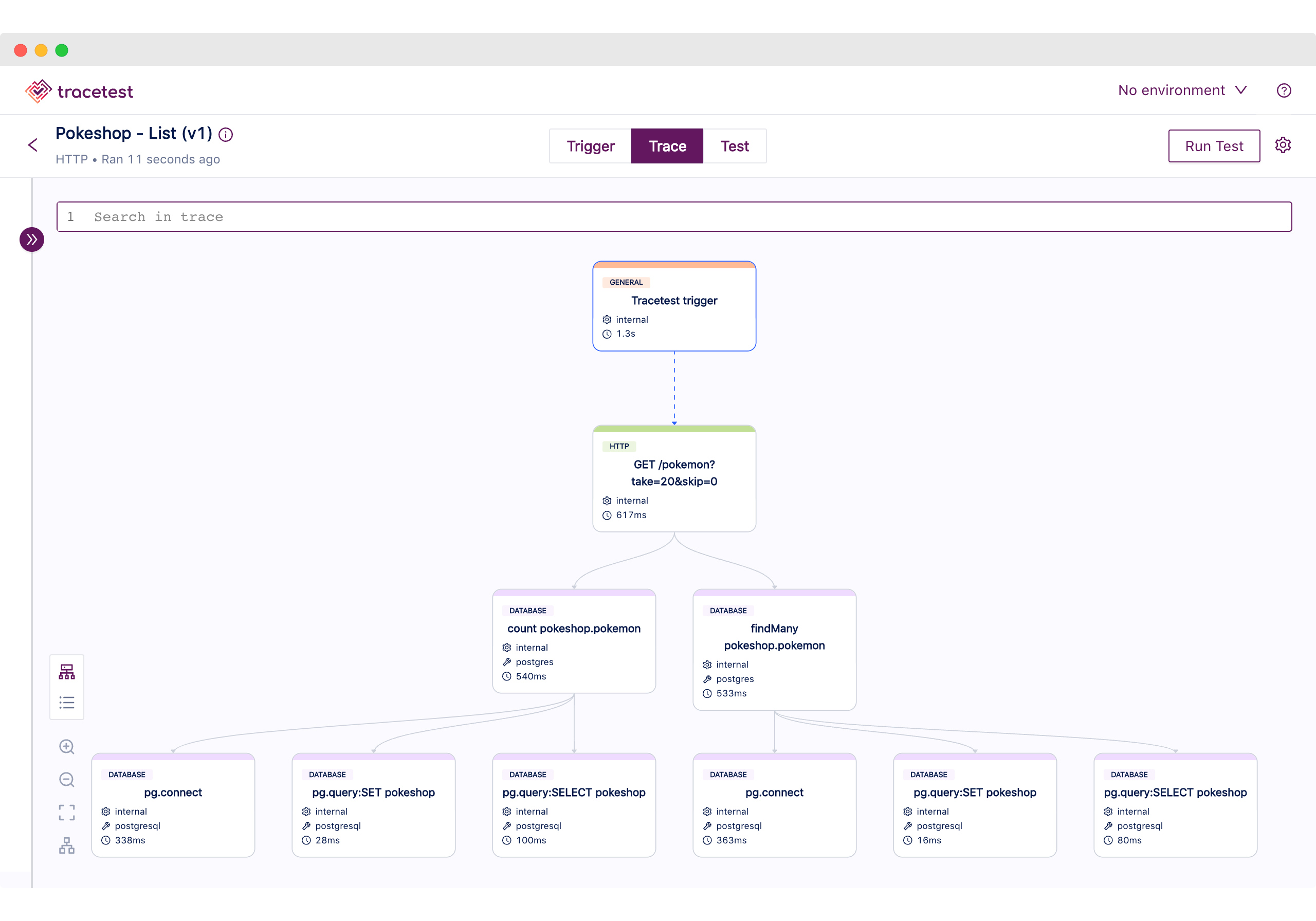
Proceed to add a test spec to assert all database queries return within 500 ms. Click the Test tab and proceed to click the Add Test Spec button.
In the span selector make sure to add this selector:
span[tracetest.span.type="database"]
In the assertion field add:
attr:tracetest.span.duration < 500ms
Save the test spec and publish the test.

The database spans that are returning in more than 500ms are labeled in red.
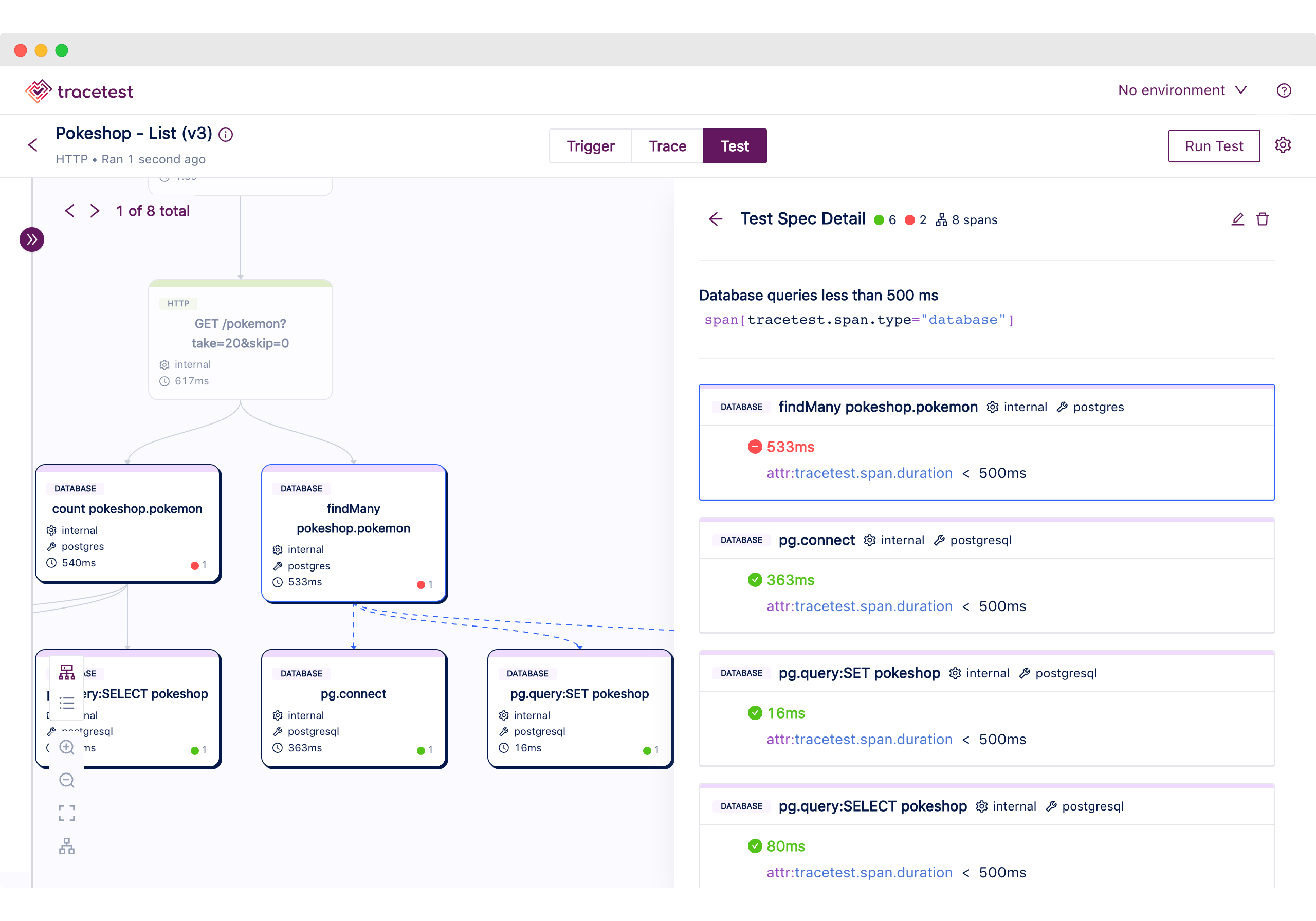
This is an example of a trace-based test that asserts against every single part of an HTTP transaction, including all interactions with the database.
However, Tracetest cannot run this test as part of your CI/CD without integrating with another tool.
Let's introduce how Tekton makes it possible.
5. Create a Task in Tekton
Click the ⚙️ button in the top right. Then click Test Definition.
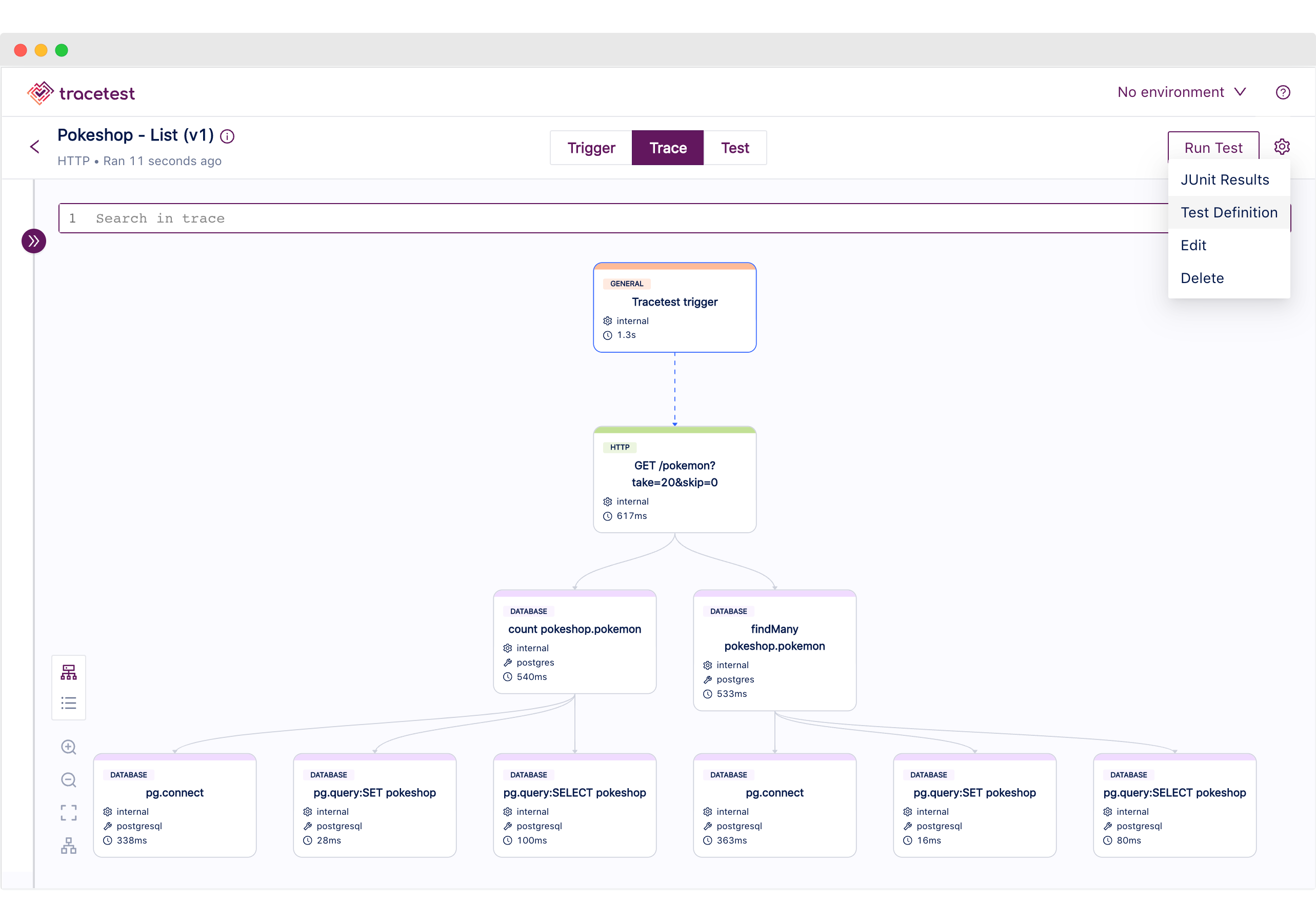
This will open a YAML definition for the test run.
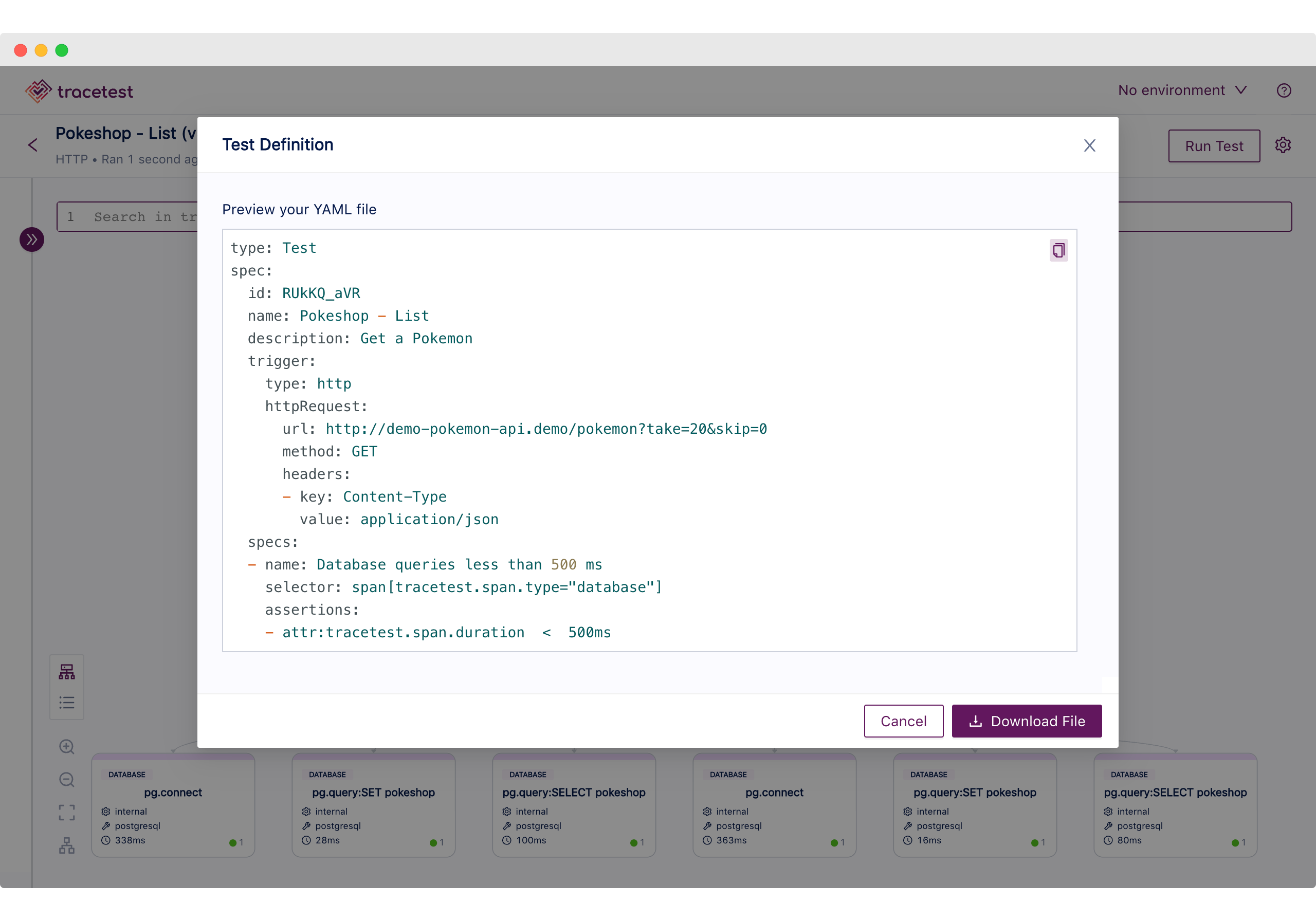
Save this into a file called test-api.yaml:
type: Test
spec:
id: RUkKQ_aVR
name: Pokeshop - List
description: Get a Pokemon
trigger:
type: http
httpRequest:
url: http://demo-pokemon-api.demo/pokemon?take=20&skip=0
method: GET
headers:
- key: Content-Type
value: application/json
specs:
- name: Database queries less than 500 ms
selector: span[tracetest.span.type="database"]
assertions:
- attr:tracetest.span.duration < 500ms
Create another YAML file, name it install-and-run-tracetest.yaml.
This contains the Tekton Task definition.
apiVersion: tekton.dev/v1beta1
kind: Task
metadata:
name: install-and-run-tracetest
spec:
steps:
- name: create-test-files
image: ubuntu
script: |
#!/usr/bin/env bash
cat <<EOF >/workspace/test-api.yaml
type: Test
spec:
id: RUkKQ_aVR
name: Pokeshop - List
description: Get a Pokemon
trigger:
type: http
httpRequest:
url: http://demo-pokemon-api.demo/pokemon?take=20&skip=0
method: GET
headers:
- key: Content-Type
value: application/json
specs:
- name: Database queries less than 500 ms
selector: span[tracetest.span.type="database"]
assertions:
- attr:tracetest.span.duration < 500ms
EOF
volumeMounts:
- name: custom
mountPath: /workspace
- name: install-and-run-tracetest
image: kubeshop/tracetest:v0.11.9 # The official Tracetest image comes with the Tracetest CLI installed
script: |
# Configure and Run Tracetest CLI
tracetest configure -g --server-url http://tracetest.tracetest.svc.cluster.local:11633/
tracetest run test -f /workspace/test-api.yaml
volumeMounts:
- name: custom
mountPath: /workspace
volumes:
- name: custom
emptyDir: {}
Make sure to use the Tracetest service as the endpoint for your tracetest configure command. This may vary depending on your installation.
http://tracetest.tracetest.svc.cluster.local:11633/
6. Run the Tracetest Trace-based Test in Tekton with a TaskRun
Finally, to run the test, create a TaskRun.
Create a file called install-and-run-tracetest-run-yaml.
apiVersion: tekton.dev/v1beta1
kind: TaskRun
metadata:
name: install-and-run-tracetest-run
spec:
taskRef:
name: install-and-run-tracetest
kubectl apply -f ./install-and-run-tracetest-run-yaml
Here's how to check the logs:
kubectl logs --selector=tekton.dev/taskRun=install-and-run-tracetest-run
You can also trigger a Task with the Tekton CLI.
tkn task start install-and-run-tracetest
TaskRun started: install-and-run-tracetest-run-xmhfg
In order to track the TaskRun progress run:
tkn taskrun logs install-and-run-tracetest-run-xmhfg -f -n default
To preview which tasks failed or succeeded, use this command:
tkn taskrun list
NAME STARTED DURATION STATUS
install-and-run-tracetest-run 3 minutes ago 23s Succeeded
install-and-run-tracetest-run-nmptn 7 minutes ago 33s Failed
install-and-run-tracetest-run-bhf7v 20 minutes ago 23s Succeeded
install-and-run-tracetest-run-wm8bj 21 minutes ago 22s Succeeded
install-and-run-tracetest-run-dbrbt 23 minutes ago 24s Failed
7. Trigger Trace-based Tests with an EventListener
By using Tektons's triggers, you can trigger tests via an eventlistener.
Create a TriggerTemplate and TriggerBinding
apiVersion: triggers.tekton.dev/v1beta1
kind: TriggerTemplate
metadata:
name: install-and-run-tracetest-template
spec:
resourcetemplates:
- apiVersion: tekton.dev/v1beta1
kind: TaskRun
metadata:
generateName: install-and-run-tracetest-run-
spec:
taskRef:
name: install-and-run-tracetest
apiVersion: triggers.tekton.dev/v1beta1
kind: TriggerBinding
metadata:
name: install-and-run-tracetest-binding
spec:
params:
- name: run
value: $(body.run)
kubectl apply -f install-and-run-tracetest-trigger-binding.yaml
kubectl apply -f install-and-run-tracetest-trigger-template.yaml
Create an EventListener
apiVersion: triggers.tekton.dev/v1beta1
kind: EventListener
metadata:
name: install-and-run-tracetest-listener
spec:
serviceAccountName: tekton-robot
triggers:
- name: install-and-run-tracetest-trigger
bindings:
- ref: install-and-run-tracetest-binding
template:
ref: install-and-run-tracetest-template
The EventListener requires a service account to run. To create the service account for this example create a file named tekton-robot-rbac.yaml and add the following:
apiVersion: v1
kind: ServiceAccount
metadata:
name: tekton-robot
---
apiVersion: rbac.authorization.k8s.io/v1
kind: RoleBinding
metadata:
name: triggers-example-eventlistener-binding
subjects:
- kind: ServiceAccount
name: tekton-robot
roleRef:
apiGroup: rbac.authorization.k8s.io
kind: ClusterRole
name: tekton-triggers-eventlistener-roles
---
apiVersion: rbac.authorization.k8s.io/v1
kind: ClusterRoleBinding
metadata:
name: triggers-example-eventlistener-clusterbinding
subjects:
- kind: ServiceAccount
name: tekton-robot
namespace: default
roleRef:
apiGroup: rbac.authorization.k8s.io
kind: ClusterRole
name: tekton-triggers-eventlistener-clusterroles
kubectl apply -f tekton-robot-rbac.yaml
kubectl apply -f install-and-run-tracetest-listener.yaml
Enable port forwarding.
kubectl port-forward service/el-hello-listener 8080
Hitting the port forwarded endpoint will trigger the task.
curl -v \
-H 'content-Type: application/json' \
-d '{"run":true}' \
http://localhost:8080
Checking the taskruns will confirm this.
tkn taskrun list
NAME STARTED DURATION STATUS
install-and-run-tracetest-run-69zrz 4 seconds ago --- Running(Pending)
Finally, check the logs:
tkn taskrun logs -f install-and-run-tracetest-run-69zrz
[install-and-run-tracetest] ✔ Pokeshop - List (http://tracetest.tracetest.svc.cluster.local:11633/test/RUkKQ_aVR/run/5/test)
[install-and-run-tracetest] ✔ Database queries less than 500 ms
Next Steps
To explore more options that Tekton gives you, check out the docs to learn more!